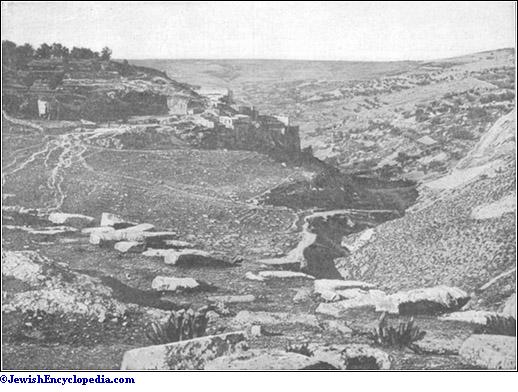Jehovah
 From Jewish Encyclopedia (1906)
From Jewish Encyclopedia (1906) Jehovah:
By: Emil G. Hirsch

A mispronunciation (introduced by Christian theologians, but almost entirely disregarded by the Jews) of the Hebrew "
 = "Adonay") with the consonants of the "ketib" (text-reading:
= "Adonay") with the consonants of the "ketib" (text-reading:
 = "
= "
 under the guttural א becomes simple
under the guttural א becomes simple
 under the י), "ḥolem," and "ḳameẓ," and these give the reading
under the י), "ḥolem," and "ḳameẓ," and these give the reading
 (= "Jehovah"). Sometimes, when the two names
(= "Jehovah"). Sometimes, when the two names
 and
and
 occur together, the former is pointed with "ḥatef segol" (
occur together, the former is pointed with "ḥatef segol" (
 ) under the י —thus,
) under the י —thus,
 (="Jehovah")—to indicate that in this combination it is to be pronounced "Elohim" (
(="Jehovah")—to indicate that in this combination it is to be pronounced "Elohim" (
 ). These substitutions of "Adonay"and "Elohim" for
). These substitutions of "Adonay"and "Elohim" for
 is also written
is also written
 , or even
, or even
 , and read "ha-Shem" = "the Name ").
, and read "ha-Shem" = "the Name ").
The reading "Jehovah" is a comparatively recent invention. The earlier Christian commentators report that the Tetragrammaton was written but not pronounced by the Jews (see Theodoret, "Question. xv. in Ex." [Field, "Hexapla," i. 90, to Ex. vi. 3]; Jerome, "Præfatio Regnorum," and his letter to Marcellus, "Epistola," 136, where he notices that "PIPI" [= ΠIΠI =
 ] is presented in Greek manuscripts; Origen, see "Hexapla" to Ps. lxxi. 18 and Isa. i. 2; comp. concordance to LXX. by Hatch and Redpath, under ΠIΠI, which occasionally takes the place of the usual κύριος, in Philo's Bible quotations; κύριος = "Adonay" is the regular translation;
see also Aquila
).
] is presented in Greek manuscripts; Origen, see "Hexapla" to Ps. lxxi. 18 and Isa. i. 2; comp. concordance to LXX. by Hatch and Redpath, under ΠIΠI, which occasionally takes the place of the usual κύριος, in Philo's Bible quotations; κύριος = "Adonay" is the regular translation;
see also Aquila
).
"Jehovah" is generally held to have been the invention of Pope Leo X.'s confessor, Peter Galatin ("De Arcanis Catholicæ Veritatis," 1518, folio xliii.), who was followed in the use of this hybrid form by Fagius (= Büchlein, 1504-49). Drusius (= Van der Driesche, 1550-1616) was the first to ascribe to Peter Galatin the use of "Jehovah," and this view has been taken since his days (comp. Hastings, "Dict. Bible," ii. 199, s.v. "God"; Gesenius-Buhl, "Handwörterb." 1899, p. 311; see Drusius on the tetragrammaton in his "Critici Sacri, i. 2, col. 344). But it seems that even before Galatin the name "Jehovah" had been in common use (see Drusius, l.c. notes to col. 351). It is found in Raymond Martin's "Pugio Fidei." written in 1270 (Paris, 1651, iii., pt. ii., ch. 3, p. 448; comp. T. Prat in "Dictionnaire de la Bible," s.v. ). See also Names of God .
The pronunciation "Jehovah" has been defended by Stier ("Hebr. Lehrgebäude") and Hölemann ("Bibelstudien.," i.).
The use of the composite "shewa" "ḥatef segol" (
 ) in cases where "Elohim" is to be read has led to the opinion that the composite "shewa" "ḥatef pataḥ" (
) in cases where "Elohim" is to be read has led to the opinion that the composite "shewa" "ḥatef pataḥ" (
 ) ought to have been used to indicate the reading "Adonay." It has been argued in reply that the disuse of the "pataḥ" is in keeping with the Babylonian system, in which the composite "shewa" is not usual. But the reason why the "pataḥ" is dropped is plainly the non-guttural character of the "yod"; to indicate the reading "Elohim," however, the "segol" (and "ḥirek" under the last syllable,
i.e.
,
) ought to have been used to indicate the reading "Adonay." It has been argued in reply that the disuse of the "pataḥ" is in keeping with the Babylonian system, in which the composite "shewa" is not usual. But the reason why the "pataḥ" is dropped is plainly the non-guttural character of the "yod"; to indicate the reading "Elohim," however, the "segol" (and "ḥirek" under the last syllable,
i.e.
,
 ) had to appear in order that a mistake might not be made and "Adonay" be repeated. Other peculiarities of the pointing are these: with prefixes ("waw," "bet," "min") the voweling is that required by "Adonay": "wa-Adonay," "ba-Adonay," "me-Adonay." Again, after "
) had to appear in order that a mistake might not be made and "Adonay" be repeated. Other peculiarities of the pointing are these: with prefixes ("waw," "bet," "min") the voweling is that required by "Adonay": "wa-Adonay," "ba-Adonay," "me-Adonay." Again, after "
 , which could not be the case if "Jehovah" (ending in ה) were the pronunciation. The accent of the cohortative imperatives (
, which could not be the case if "Jehovah" (ending in ה) were the pronunciation. The accent of the cohortative imperatives (
 ), which should, before a word like "Jehovah," be on the first syllable, rests on the second when they stand before
), which should, before a word like "Jehovah," be on the first syllable, rests on the second when they stand before
 , which fact is proof that the Masorites read "Adonay" (a word beginning with "a").
, which fact is proof that the Masorites read "Adonay" (a word beginning with "a").
- Schrader-Schenkel, Bibellexikon, iii. 147 et seq.;
- Köhler, De Pronunciatione Tetragrammatis, 1867;
- Driver, Recent Theories on the . . . Pronunciation, etc., in Studia Biblica, i., Oxford, 1885;
- Dalman, Der Gottesname Adonaj und Seine Gesch. 1889;
- Dillmann, Kommentar zu Exodus und Leviticus, p. 39, Leipsic, 1897;
- Herzog-Hauck, Real-Encyc. viii., s.v. Jahve.
Categories: [Jewish encyclopedia 1906]
↧ Download as ZWI file | Last modified: 09/04/2022 19:15:04 | 167 views
☰ Source: https://www.jewishencyclopedia.com/articles/8568-jehovah.html | License: Public domain
 ZWI signed:
ZWI signed: KSF
KSF